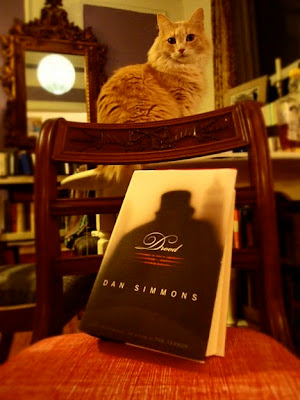We have a problem though. We only read massive books together. Our last undertaking was Byatt's Possession.
This time: Dan Simmons' Drood.

This massive book could protect you against intruders, be used instead of hand weights while exercising, and maybe even turn into a table. At nearly 800 pages one wonders: does it have to be so long simply because it concerns Charles Dickens (writer of lengthy sentences and books)?
Drood examines the last five years of Dickens' life through the eyes of his opium addict frenemy Wilkie Collins.
I knew the book was going to be something about the making of Dickens' last and unfinished novel The Mystery of Edwin Drood (which Jabba and I will also be reading), but I didn't expect Wilkie. Reading the first page I was like: Wilkie...like The Wilkie...like The Woman in White Wilkie...really? We're doing this?
At it's worst, Drood is fan fiction for Victorian Lit nerds.
At it's best, Drood is a rousing tale of mystery and manipulation.
At it's best, Drood is a rousing tale of mystery and manipulation.
The question remains: Would I have liked it as much as I did if it wasn't based on real people that I have background knowledge of? The answer: I don't think so.
I think a non-Vic Lit person reading Drood would feel like I felt when I read Vivaldi and the Number 3: like you're missing all of the inside jokes. You're not in the club of esoteric knowledge and so the story is entertaining but missing a key piece.
Having said that, as an English Lit (and specifically Victorian Lit) person, reading Drood was like watching: Dickens and Wilkie, the E! True Hollywood Story.
Not only does the reader get an unreliable narrator (yay!) in Wilkie Collins, but there is also insight into the creative process (and all the manipulation and competition that goes into it) of one of history's favorite writers.
And don't forget mesmerism. What is the Victorian period without rich people engaging in dark magic?
Overall, Drood was fun...but. BUT.
As the madre would say, Simmons is no Dickens. True. But does he need to be?
I will say the first 400 pages are better than the second. Which would be the opposite of reading Dickens.
And when I finally got to the 4th anniversary of Dickens' meeting the spooky Drood (you know Dickens will die on an anniversary of meeting the death/ghost/Egyptian/spirit/phantom) and Dickens doesn't die...I had to walk away from the book for a minute because: I HAVE TO READ ABOUT ANOTHER ENTIRE YEAR.
And Wilkie's unreliable narrator gets downright whiny and annoying by the end.
And then there's the issue of the killing of three dogs.
Mixed. My feelings are mixed.
I do, however, thank Drood for making me want to go back and read Wilkie's The Moonstone and The Woman in White, and Dickens' Little Dorrit and The Mystery of Edwin Drood.
To conclude my waffling opinion: if only for the traipsing through the Victorian period looking over the shoulders of great writers, Drood was worth reading.

"His gaze wandered from the windows to the stars, as if he would have read in them something that was hidden from him. Many of us would, if we could; but none of us so much as know our letters in the stars yet - or seem likely to do it, in this state of existence - and few languages can be read until their alphabets are mastered."
Charles Dickens, The Mystery of Edwin Drood.
Charles Dickens, The Mystery of Edwin Drood.

My book group has picked The Moonstone for this month. I don't read many male writers(!) and I can't say I'm looking forward to it, but your Victorian post has renewed my enthusiasm.
ReplyDelete